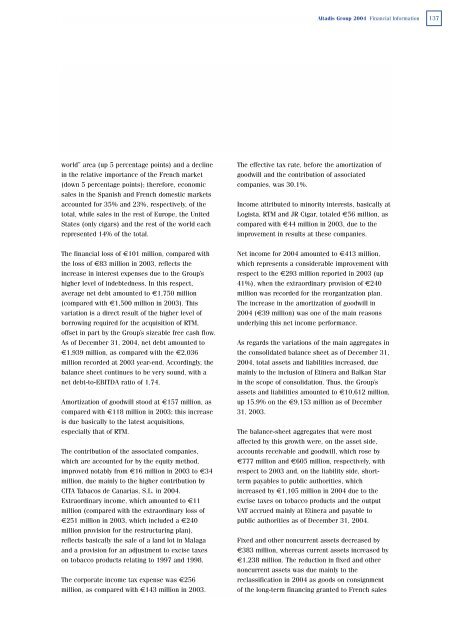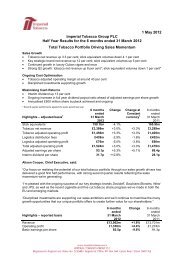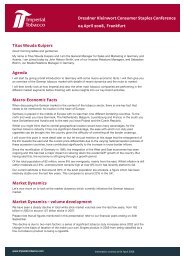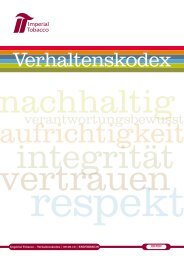Annual report 2004 (English) - PDF 3546K - Imperial Tobacco
Annual report 2004 (English) - PDF 3546K - Imperial Tobacco
Annual report 2004 (English) - PDF 3546K - Imperial Tobacco
You also want an ePaper? Increase the reach of your titles
YUMPU automatically turns print PDFs into web optimized ePapers that Google loves.
68<br />
These principles are enshrined in the Group’s Code<br />
of Conduct, which may be consulted on the corporate<br />
Web site at www.altadis.com. Cross-functional policies<br />
have necessarily been established in certain key areas,<br />
including:<br />
• executive personnel management (compensation,<br />
performance assessment, allocation of stock options,<br />
skills and career enhancement, mobility, training),<br />
• employee support during periods of restructuring,<br />
• the application of methodologies that permit<br />
continuous improvements in safety and working<br />
conditions.<br />
It should be noted, however, that because of the<br />
application of differing regulations and assessment<br />
criteria across countries, it can sometimes be diffi cult to<br />
provide Group-level indicators in areas such as training<br />
and safety.<br />
Compensation:<br />
performance assessment<br />
Whereas employee compensation policies are managed<br />
autonomously by each country in accordance with<br />
national data, a standardized approach has been<br />
adopted throughout the Group in the case of executive<br />
remuneration. The variable component of this<br />
remuneration is determined on the basis of an annual<br />
performance assessment, with three parameters<br />
applied for this purpose: company results, fulfi llment<br />
of individual objectives and commitment to corporate<br />
values. The establishment of job descriptions has also<br />
provided a basis for objective comparisons of managers’<br />
salaries relative to market trends.<br />
<strong>2004</strong> saw the introduction of a job analysis system<br />
based on a common skills-defi nition model. This<br />
model, applicable throughout the Group, will permit<br />
a systematic approach to workforce planning founded<br />
on optimum career progression, performance<br />
enhancement, and skills and behavior development for<br />
the achievement of corporate objectives.<br />
Safety and working<br />
conditions:<br />
a long-term approach<br />
Safety has always been a priority for Altadis, beyond<br />
legal compliance. The Group remains committed to<br />
reducing the frequency and severity of accidents in<br />
the workplace through preventive action and training,<br />
and has introduced polices over the years to promote<br />
safety on an ongoing basis. These policies are rooted in<br />
continuous accident analysis, corrective and preventive<br />
action plans, involvement of the entire management<br />
chain and awareness/monitoring programs to ensure<br />
adherence to the decisions taken. Teams in the various<br />
countries share their results and best practices in<br />
order to deliver continuous improvements in safety<br />
performance. Safety-related training is key to the<br />
preventive process and is increasingly interlinked with<br />
environmental protection initiatives.<br />
The Group invested some EUR 4.2 million in safety<br />
measures in <strong>2004</strong>, and Altadis now ranks among the<br />
companies that have obtained sustainable results in the<br />
prevention of accidents and their consequences. The<br />
efforts deployed testify to the Group’s commitment to<br />
supporting and developing occupational risk prevention








